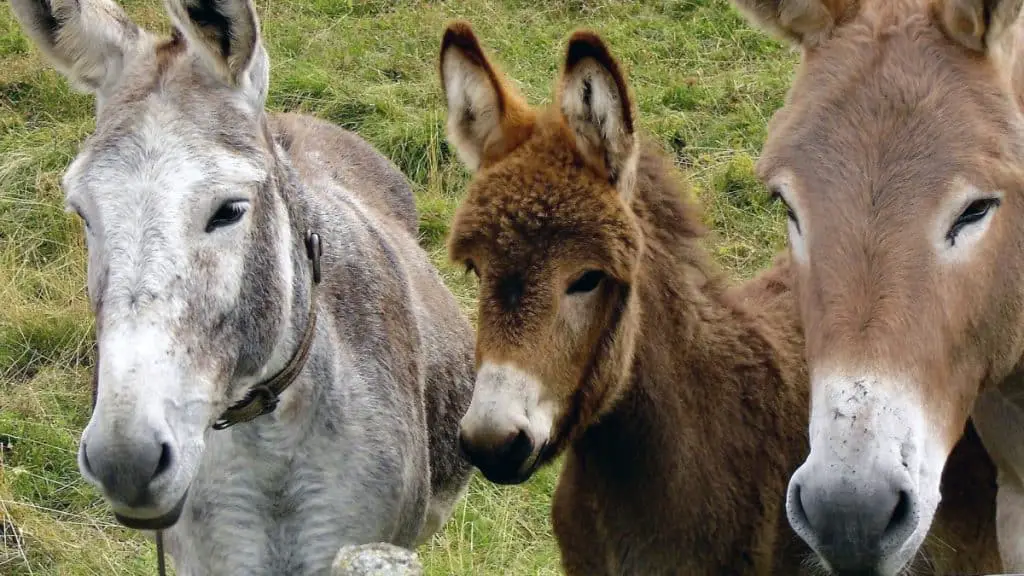Skip To Section
Yes, donkeys can reproduce, either with their own kind, or with horses. When donkeys and horses breed, they will either produce a hinny or a mule, which are unique creatures and have characteristics taken from both parents.
While mules and hinnies are desirable creatures, they are usually sterile, and cannot reproduce; you will need another horse and donkey to produce more babies.

Donkeys can, of course, be bred with other donkeys, and the result will be another domestic donkey. A male donkey jack and a female donkey jenny are fine for producing offspring of their own kind, but if you want mules (or hinnies), you will have to bring a horse into the mix.
If you’re wondering about the difference between a donkey and a mule, you’ll find that mules are usually larger than donkeys, and sometimes are even larger than horses. The noise that they make sounds much like a cross between a horse’s whinny and a donkey’s bray.
Interestingly, mules and hinnies have an odd number of chromosomes. Donkeys have only 62 chromosomes, while horses have 64 – and their offspring have 63 chromosomes.
Mules are often hardier than horses, and can be less stubborn than donkeys, so they offer an excellent mix of the best characteristics of both creatures. They need less food than horses, they are less susceptible to diseases, and they are often more willing than donkeys.
This makes them excellent on farms, and many farmers will breed or buy mules rather than donkeys or horses – but it must be borne in mind that these animals will not (usually) be able to reproduce.
Can A Female Donkey And A Male Horse Reproduce?
Yes, a female donkey and a male horse can reproduce. A female donkey (a jennet or jenny) can be bred with a male horse stallion to produce a mule – or, more accurately, a hinny.
Hinnies do not tend to be as popular as mules, because they are a little closer to their donkey parents, and tend to be slightly stubborner and less easily led. They are often a little slower, more cautious, and less flighty.
Much of this may be to do with upbringing; the hinny is raised by a donkey mother, and therefore takes on more of her characteristics. Both horses and donkeys are pack animals, but you’re more likely to see hinnies with donkeys than horses if they are given the choice.
Hinnies will usually eat a great range of food, like donkeys, and they are resistant to diseases, parasites, and harsh weather.
They are sometimes more sought after in particularly difficult climates – being a little closer to their donkey ancestors makes them popular in places where endurance is important.
Can A Male Donkey And A Female Horse Reproduce?
Yes, a jack and a female horse can reproduce. A female horse mare and a male donkey will produce a mule, which usually takes on more of the characteristics of its horse mother.
Mules are often slightly more selective about their foods, copying their horse mothers. They tend to be slightly easier to startle, but they will take on the strength and perseverance of their fathers, and are often considered better workhorses accordingly.
Mules tend to have slightly more horse-like hooves than hinnies; they are often somewhat rounder, with a little more angle. However, they are not as flat or as angled as a horse’s hooves.
As with hinnies preferring donkeys, many mules prefer the company of horses, because they were raised by a horse. However, this is not a hard and fast rule; it can vary greatly between individuals, with some mules preferring to seek out donkey companionship.
Can A Female Mule Get Pregnant?
If mules are sterile, you might be wondering if mare mules can become pregnant. The answer is that they can, but this is quite rare. Artificial pregnancies can be achieved, or natural ones may sometimes happen.
Because of the odd number of chromosomes, it’s difficult for mules to reproduce naturally, and while male mules (also known as a horse mule) can impregnate females, there have only been sixty documented cases of successful births since the 1500s.
In some cases of mule reproduction, the mare is mated with a purebred donkey or a horse, and the foal that is produced is a filly or a colt – not a mule of any sort.
It seems donkey, mule, and horse genetics can be quite confusing in some cases. Some mules produce horses or donkeys when they breed, despite the fact that the mother does not quite belong to either species.
Cloning is also of some interest in the mule reproduction world, and in 2003, Utah State University and the University of Idaho managed to successfully clone the first mule. This extraordinary and controversial technique may continue as people try to breed the best mules for work or as pets.
How Can Horses And Donkeys Reproduce?
Horses and donkeys are able to reproduce because they are similar animals, and although different species, they are closely related.
There are many other kinds of animals that can successfully breed with a different but related species, although it does often result in sterile offspring for the reasons already mentioned. Essentially, the two animals are close enough that breeding can occur in the normal way without presenting problems.
Sometimes, however, complications do arise, especially if there is a significant size difference between the parents. This is particularly true if the mare is smaller than the stallion (or jack, though this is less likely as donkeys tend to be smaller than horses).
Often, this will result in birth complications because the donkey’s body is not big enough to cope with the size of the baby. In general, breeding pairs should be close in size to avoid this sort of issue.
Conclusion
Donkeys can therefore reproduce with their own kind, but can also easily reproduce with other species too.
Although their offspring can rarely breed because of their odd number of chromosomes, they do carry significant advantages that mean they have remained popular over the years despite this disadvantage.
As our understanding of genetics advances, we may see further opportunities to breed donkeys and horses successfully.
References
- https://www.quora.com/If-horse-and-donkey-are-two-different-species-then-how-come-they-can-breed-with-each-other
- https://www.bnd.com/living/liv-columns-blogs/answer-man/article135296594.html
- https://www.luckythreeranch.com/lucky-three-ranch-training/mule-facts/?doing_wp_cron=1621774172.5016489028930664062500
- https://animals.mom.com/difference-between-mules-donkeys-7249.html
- https://en.wikipedia.org/wiki/Mule
- https://www.todayifoundout.com/index.php/2012/08/difference-between-a-donkey-and-a-mule/
- https://en.wikipedia.org/wiki/Donkey
- https://aaep.org/horsehealth/donkey-reproduction

